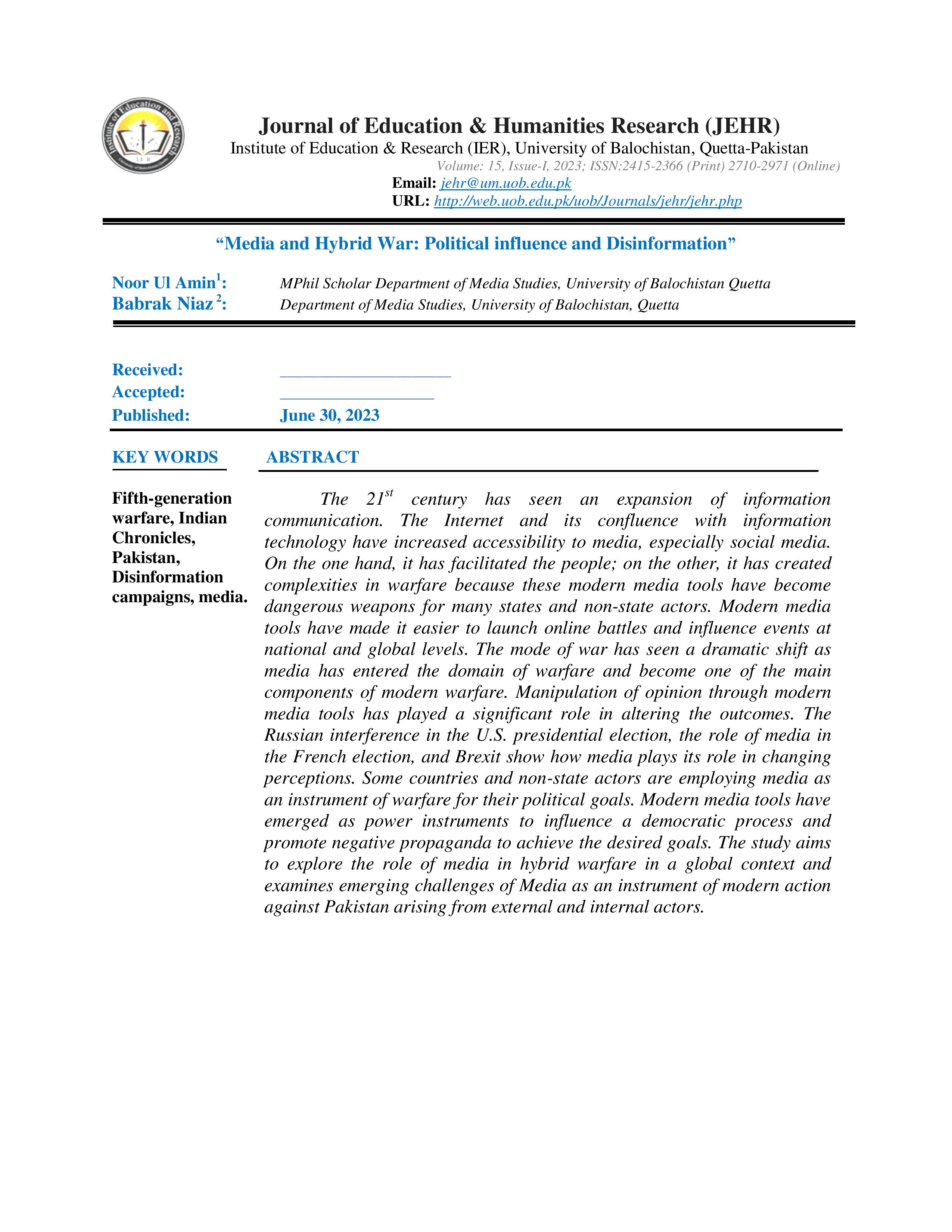Media and Hybrid War: Political influence and Disinformation
Abstract
The 21st century has seen an expansion of information communication. The Internet and its confluence with information technology have increased accessibility to media, especially social media. On the one hand, it has facilitated the people; on the other, it has created complexities in warfare because these modern media tools have become dangerous weapons for many states and non-state actors. Modern media tools have made it easier to launch online battles and influence events at national and global levels. The mode of war has seen a dramatic shift as media has entered the domain of warfare and become one of the main components of modern warfare. Manipulation of opinion through modern media tools has played a significant role in altering the outcomes. The Russian interference in the U.S. presidential election, the role of media in the French election, and Brexit show how media plays its role in changing perceptions. Some countries and non-state actors are employing media as an instrument of warfare for their political goals. Modern media tools have emerged as power instruments to influence a democratic process and promote negative propaganda to achieve the desired goals. The study aims to explore the role of media in hybrid warfare in a global context and examines emerging challenges of Media as an instrument of modern action against Pakistan arising from external and internal actors.
References
Ahmed, W. (2020, December 14 December 14). How India destabilizes Balochistan. Retrieved from https://www.thenews.com.pk/print/758438-how-india-destablises-balochistan
Buchanan, B. (2020). The Hacker and the State: Cyber Attacks and the New Normal of. Harvard University Press.
Berzins, J. (2014). Russia's New Generation Warfare in Ukraine: Implications for Latvian Defense Policy. Centre for Security and Strategic Research.
Baloch, M. A. N., Mustafa, G., Kakar, A., & Kakar, S. A. (2021). Balochistan and Fifth Generation Warfare: Role of External Powers. Journal of the Research Society of Pakistan, 58(2), 140.
Nadeem, M. A., Kakar, S. A., Khan, S. A., & Mustafa, G. (2021). The emergence of hybrid warfare and international security environment: a case study of Pakistan. Pakistan Journal of International Affairs, 4(4).
Centner, C. (2019). Russia's hybrid warfare. The Washington Post.
Cullen, E. R.-K. (2016). What is Hybrid Warfare? Norwegian Institute of International Affairs, p. 4.
Dank, Y., Maliarchuk, T., & Briggs, C. (2017). Hybrid War: High-tech, Information, and Cyber. Connections The Quarterly Journal, 16(2).
Dawn. (2021, July 19 July 19). 'Pakistan being targeted through hybrid warfare,' N.S.A. Yusuf says in a briefing on Afghan' abduction' incident. Retrieved from https://www.dawn.com/news/1636032
Frolova, I. (2015). On the expression of subjectivity in analytical articles of the British and Russian Quality press. Politicheskaya Lingvistika, 1, 138–145
Faber & Faber. (1927). The Indirect Approach. In B. L. Hart, The Strategy of Indirect Approach. London.
Ferrara, E. (2017). Disinformation and social bot operations in the run-up to the 2017 French presidential election. arXiv preprint arXiv:1707.00086.
Galeotti, M. (2015). "Hybrid war" and "little green men": How it works, and how it does not. In A. Pikulicka- Wilczewska & R. Sakwa (Eds.), Ukraine and Russia: People, politics, propaganda and perspectives (pp. 156–164). E- International Relations.
Hoskins, A., & O’Loughlin, B. (2015). Arrested war: The third phase of mediatization. Information, Communication and Society, 18(11), 1320–1338.
HoffŵaŶ, FƌaŶk. ϮϬϬϳ. ͞CoŶfliĐt iŶ Ϯϭst ĐeŶtuƌLJ: a ƌise of hLJďƌid ǁaƌs͟. Potomac institute for political studies. Available at: http://www.potomacinstitute.org/im ages/stories/publications/potomac_h ybridwar_0108.pdf. Accessed November 21 November 21, 2016.
Machado , G., Alaphilippe, A., & Adamczyk, R. (2020). Indian Chronicles: deep dive into a 15-year operation targeting the E.U.E.U. and U.N.U.N. to serve Indian interests. Retrieved from https://www.disinfo.eu/publications/indian-chronicles-deep-dive-into-a-15-year-operation-targeting-the-eu-and-un-to-serve-indian-interests/
Malik, M. (2018, November 24). Pakistan’s faultlines and hybrid war challenge. Retrieved from https://nation.com.pk/24-Nov-2018/pakistan-s-faultlines-and-hybrid-war-challenge
Marovic, J. (2019, November 28). Wars of Ideas: Hybrid Warfare, Political Interference, and Disinformation. New Perspectives on Shared Security: NATO’s Next 70 Years.
Ministry of Information and Broadcasting. (2021). Ministry of Information and Broadcasting Government of Pakistan. Retrieved from https://dmw.gov.pk/storage/report/DETAILED%20ANALYTICS%20REPORT%20-%20Anti%20Pakistan%20Trends%20PTM,%20Indian,%20Political%20Parties%20and%20Fake%20News%20Nexus%20June%202019%20-%20August%202021.pdf
Mitrovic, M. (2018, September 10). The Genesis of Propaganda as a Strategic Means of Hybrid Warfare Concept. Vojno Delo, 7(1). Strategic Research Institute.
The NATO Military Policy for Information ~Operations (February 11 February 11, 2015) defines the Information Environment as the environment that is comprised of the information itself, the individuals, organizations, and systems that receive, process, and convey information, and the cognitive, virtual, and physical space in which this occurs.
Prior, J. (2017). Commanding the Trend: Social Media as Information Warfare. Strategic Studies Quarterly, 11(4).
Press T.V. (2018). "Social Media Manipulation Putting U.K.U.K. Democracy at Risk: Report," Press T.V.T.V., (July 28, 2018), retrieved May 20, 2019, from https://www.presstv.com/Detail/201 8/07/28/569506/Britain-social- media-fake-news-investigation.
Rosenberger, L. (2020, June). They are making Cyberspace Safe for Democracy: The New Landscape of Information Competition. Foreign Affairs. Retrieved from https://www.foreignaffairs.com/.
Renz, B. (2016). Russia and 'hybrid warfare. Contemporary Politics, 22(3), 283– 300.
Simons, G. (2010). Mass Media and Modern Warfare: Reporting on the Russian War on Terrorism. London: Routledge.
Singer, P. W., & Brooking, E. T. (2018). The Weaponization of Social Media. Houghton Mifflin Harcourt.
Svetoka, S. (2016). Social Media as a Tool of Hybrid Warfare. NATO Strategic Communications Centre of Excellence.
Tahir, I. A., & Afridi, M. K. (2019). Fifth Generations Warfare (5GW)-The New Dimensions of Enemies Launched Warfare and Security Concern of Pakistan. Global Regional Review (G.R.R.), IV(1).
Tsu, S. (2016). The Art of War. Cosimo Classics.
Yerlikaya, T., & Aslan, S. T. (2020). Social Media and Fake News in the Post- Truth Era. Insight Turkey, 22(2), 177-196.




